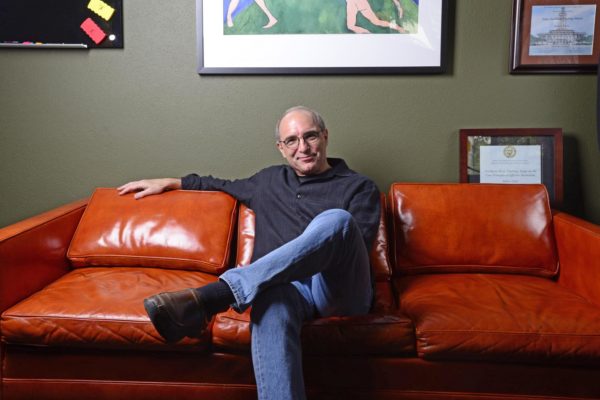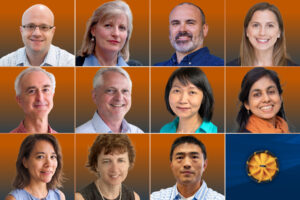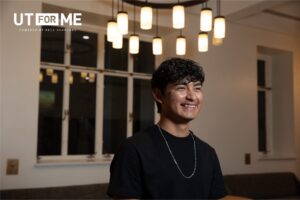Can playing a musical instrument make you a genius? Probably not, says Bob Duke, director of the Center for Music Learning at The University of Texas at Austin, but it is giving your brain a great workout.
“Few activities engage the brain like music does,” said Duke, who for 32 years has led classes and national research on music and the brain. “My focus throughout my career has been on learning and human behavior. And because I am a musician, I do that in the context of studying music makers.”
That is why he founded the Center for Music Learning within the Butler School of Music in 2002. The goal of the center is to break down barriers between disciplines by bringing together expert teachers, performers, composers, psychologists, neuroscientists and physiologists.
In the spring of 2016, he was inducted into The University of Texas System Academy of Distinguished Teachers for his interdisciplinary leadership.
Duke is also known across campus. With Professor Jay Banner, he leads a class at the Jackson School of Geosciences on better science communication, he teaches in a first-year course at the Dell Medical School on brain and behavior, and he co-hosts the public radio program and podcast “Two Guys on Your Head,” produced by KUT 90.5 FM in Austin.
We talked to Duke to learn why he believes there is more to music education than just learning how to play an instrument well, and how it can deepen our fundamental understanding of how people learn.
Why do you think people love music?
There are few human activities that engage the brain as much as music making. It’s got an auditory component, a motor component and an emotional component. I don’t think there’s any observed culture, primitive or otherwise, that doesn’t have music as part of the culture. Music is a deep part of human societies and social functioning.
It’s a popular belief that listening to music can make you smarter. Is that true?
There was a real push in the 1990s that just listening to music, particularly classical music, would actually improve thinking. It went so far that in 1998, Gov. Zell Miller of Georgia actually handed out classical music CDs and cassettes to every new mother leaving the hospital with her new baby. The idea was that just playing these CDs for babies would make them smarter. But it just doesn’t work like that.
Learning to play music does strengthen the brain. But everything we learn changes and grows the brain. That’s what learning is. Playing chess or learning to speak a foreign language would be similar. I love music and have dedicated my life to it, but if you want to do better at math, learning to play the clarinet won’t get you there.
What is unique about learning music?
Music unfolds through time, and participating in music making requires a high level of coordination among multiple systems in the brain. It requires a level of attention to keep up with the timing and to coordinate what you’re doing with an ongoing pulse or with other musicians. Music requires a different level of attention than other activities that don’t have that timing component.
As an art, music engages cognitive and perceptual capacities, emotions and the motor system in ways that other forms of learning do not. Playing an instrument or singing also has the additional benefit of being pleasurable.
Why is music a good way to research learning?
One of the most interesting parts about studying music teaching is the progress that a learner makes is so apparent throughout the process.
For instance, if you’re teaching mathematics to somebody, as they are puzzling over word problems, you really don’t have the same kind of sense of how well they are understanding or acquiring the skills that you are teaching them. One of the advantages of studying music learning is that whatever learners are accomplishing moment to moment is immediately visible and audible. If I’m trying to teach someone to play the clarinet, and we’re trying to work out some little passage she’s having trouble with in a piece, I know in the moment how well my student is accomplishing the goals we’re after.
If people want to learn to play music better, what should they know?
Many people think to be good at playing music, they need to learn all the rules and apply them quickly. Well yeah, but if you’re consciously thinking about all those rules, you’re never going to be able to apply those rules fast enough to sound fluent, just like learning to speak a new language. Some of our work in the Center for Music Learning several years ago revealed some important aspects of automaticity and music, by studying jazz musicians. What we found is you don’t need to think faster as you move from novice to expert. You need to think differently.
The dorsolateral prefrontal cortex, a part of your brain on either side of the top of your forehead, is involved in planning and decision making. Some may think playing complex music would require a lot of decisions, but the interesting part is when musicians are improvising, activity is greatly diminished in that area of the brain. When jazz musicians improvise, one of the things that happens is that the self-evaluative judging part has to go away a little bit. You can’t create and evaluate everything you’re doing at the same time. The evaluating part happened when you were learning. Now you are just acting, which is kind of a cool thing.
What research are you working on right now?
I was in a jazz improvisation master class years ago, and one of the students asks the teacher, “How do you know what notes to play?” And the musician says, “I just feel it, man.” That’s not very helpful, but how do you teach that? Many experts in different disciplines can’t really explain what it is that characterizes their expertise. Their thinking process is invisible, sometimes even to the experts themselves.
Training teachers to be effective is a huge part of our mission here at the Butler School. We have been collaborating with Mary Hayhoe and her colleagues in the Psychology Department who study visual gaze. By analyzing where people look and where they focus their attention, we can learn something about how the brain is processing information in the environment. What’s interesting to me is that this technology has not been deployed effectively in studying the interactions between teachers and learners. For the past 18 months, we have been figuring out how the study of visual gaze can help us understand how experts think and to use that information to improve teaching. I think this research will show us how expert teachers do what they do in a way that even many experts may not realize.
Why is the center in the division of ‘Music Learning’ instead of ‘Music Education’?
Our primary research question is: How do people learn music and respond to music? We take the focus off of making guidelines for what teachers should do and say, and put the focus on understanding what’s going on in the brain when someone is learning to play the violin. Or what’s going on in the head of a 2-year-old who’s singing with her mom.
There aren’t many places around the country that take this approach. The center has really attracted a different kind of graduate student to our program – people who really are interested in thinking about music from an interdisciplinary perspective that doesn’t have a typical place in the university.
For more information, visit the website for the Center for Music Learning.
Bob Duke is the Marlene and Morton Meyerson Centennial Professor and head of Music and Human Learning at The University of Texas at Austin, where he is a University Distinguished Teaching Professor, the Elizabeth Shatto Massey Distinguished Fellow in Teacher Education, and director of the Center for Music Learning. He is also a clinical professor in the Dell Medical School.




